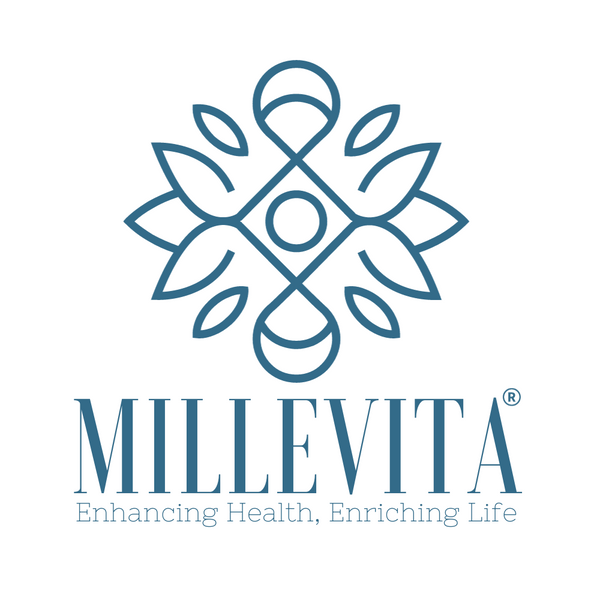
The Health Benefits of Vitamin D3 and K2: A Comprehensive Overview
Share
Vitamin D3, also known as cholecalciferol, is a fat-soluble vitamin primarily produced in the skin in response to sunlight exposure. It is essential for calcium absorption and plays a critical role in various physiological processes, including immune regulation and bone metabolism.
Vitamin K2, a form of vitamin K, is also fat-soluble and is involved in calcium regulation and blood clotting. Unlike vitamin K1, which is found in leafy greens, K2 is typically found in fermented foods and animal products. Its role in activating proteins that regulate calcium deposition is particularly significant.
The Role of Vitamin D3 in Health
1. Bone Health
Vitamin D3 is perhaps best known for its role in supporting bone health. It facilitates calcium absorption in the gut and helps maintain adequate serum calcium and phosphate levels necessary for healthy bone mineralization. Without sufficient vitamin D3, bones can become thin, brittle, or misshapen, leading to conditions such as rickets in children and osteomalacia or osteoporosis in adults.
2. Immune Function
Vitamin D3 plays a vital role in modulating the immune system. It enhances the pathogen-fighting effects of monocytes and macrophages and reduces inflammation. Studies have shown that adequate vitamin D3 levels can help prevent infections and reduce the severity of autoimmune conditions like multiple sclerosis and rheumatoid arthritis.
3. Mood Regulation
Low levels of vitamin D3 have been linked to depression and seasonal affective disorder (SAD). This vitamin influences the production of serotonin, a neurotransmitter that affects mood. Supplementing with vitamin D3 can help improve symptoms of depression and promote emotional well-being.
4. Heart Health
Emerging research suggests that vitamin D3 contributes to cardiovascular health by reducing inflammation, improving arterial function, and regulating blood pressure. Deficiency in vitamin D3 has been associated with an increased risk of hypertension, heart disease, and stroke.
The Role of Vitamin K2 in Health
1. Calcium Utilization
Vitamin K2 is essential for activating proteins like osteocalcin and matrix Gla-protein (MGP), which direct calcium to the bones and teeth and away from soft tissues. This function is crucial for preventing arterial calcification and maintaining cardiovascular health.
2. Bone Strength
Vitamin K2 works synergistically with vitamin D3 to ensure calcium is properly utilized in the body. It enhances bone density and strength by activating osteocalcin, which binds calcium to the bone matrix.
3. Cardiovascular Protection
By preventing calcium buildup in the arteries, vitamin K2 significantly reduces the risk of atherosclerosis. It supports healthy blood flow and reduces the likelihood of heart attacks and strokes.
4. Dental Health
Vitamin K2 contributes to dental health by promoting the remineralization of teeth and preventing tooth decay. It supports the production of dentin, the calcified tissue beneath the enamel.
The Synergy Between Vitamin D3 and K2
While vitamin D3 boosts calcium absorption, vitamin K2 ensures that calcium is directed to the right places—bones and teeth—rather than accumulating in the arteries or soft tissues. This synergy highlights why it is essential to balance these vitamins in your diet or supplementation regimen.
Benefits of Combining Vitamin D3 and K2:
- Enhanced Bone Strength: The combination helps maximize calcium utilization, improving bone density and reducing the risk of fractures.
- Reduced Arterial Calcification: Together, they lower the risk of heart disease by preventing calcium deposits in the arteries.
- Improved Overall Health: This duo supports the body's intricate calcium regulation system, benefiting both skeletal and cardiovascular systems.
Dietary Sources of Vitamin D3 and K2
Vitamin D3 Sources:
- Sunlight: The most natural source of vitamin D3 is sunlight. Spending 10-30 minutes in the sun several times a week can help maintain optimal levels.
- Food Sources: Fatty fish like salmon, mackerel, and sardines; fortified foods such as milk, orange juice, and cereals; egg yolks.
- Supplements: Vitamin D3 supplements are widely available and can help individuals with limited sun exposure.
Vitamin K2 Sources:
- Fermented Foods: Natto (fermented soybeans) is an excellent source of vitamin K2.
- Animal Products: Cheese, butter, and egg yolks contain significant amounts.
- Supplements: Vitamin K2 supplements are an alternative for those with dietary restrictions or limited access to food sources.
Signs of Deficiency
Vitamin D3 Deficiency:
- Bone pain and muscle weakness
- Frequent infections
- Fatigue and depression
- Increased risk of chronic diseases
Vitamin K2 Deficiency:
- Easy bruising and bleeding
- Osteopenia or osteoporosis
- Calcification of arteries and soft tissues
Optimal Dosage and Supplementation
Vitamin D3:
The recommended daily intake varies depending on age, geographic location, and sun exposure. For most adults, 600-800 IU is sufficient, though higher doses may be necessary for those with deficiency.
Vitamin K2:
An adequate intake of 90-120 mcg per day is recommended. However, therapeutic doses may be higher for specific health conditions.
Combination Supplements:
Many healthcare providers recommend supplements that combine vitamin D3 and K2 to optimize their synergistic effects.
Health Risks of Over-supplementation
While supplementation is beneficial, excessive intake of vitamin D3 or K2 can lead to adverse effects.
Vitamin D3:
High doses of vitamin D3 can cause hypercalcemia, leading to nausea, kidney stones, and calcification of soft tissues.
Vitamin K2:
Although rare, excessive vitamin K2 supplementation can interfere with blood-thinning medications like warfarin.
Key Studies and Scientific Evidence
- Bone Health: A 2018 study in the Journal of Bone and Mineral Research found that combining vitamin D3 and K2 significantly improved bone mineral density in postmenopausal women.
- Heart Health: A 2015 study in the Journal of the American Heart Association highlighted the role of vitamin K2 in reducing arterial calcification and improving cardiovascular outcomes.
- Immunity: Research published in Nutrients in 2020 demonstrated that adequate vitamin D3 levels reduced the severity of respiratory infections, underscoring its immune-boosting properties.
Practical Tips for Incorporating D3 and K2 into Your Life
- Get Regular Sunlight: Aim for moderate sun exposure daily.
- Eat a Balanced Diet: Include fatty fish, fermented foods, and egg yolks in your meals.
- Consider Supplements: If dietary intake or sun exposure is insufficient, choose a high-quality vitamin D3 and K2 supplement.
- Monitor Your Levels: Regular blood tests can help ensure you're maintaining optimal levels of these vitamins.
Conclusion
Vitamin D3 and K2 are powerful nutrients that, when taken together, can significantly enhance your health. From stronger bones and improved immunity to better cardiovascular health, the benefits of these vitamins are vast and well-supported by scientific research. By ensuring adequate intake through diet, sun exposure, or supplementation, you can harness the synergistic power of vitamin D3 and K2 for long-term well-being.
Disclaimer
This article is for informational purposes only and is not intended as a substitute for professional medical advice, diagnosis, or treatment. Always seek the advice of your physician or other qualified healthcare provider with any questions you may have regarding a medical condition or nutritional supplementation. Never disregard professional medical advice or delay seeking it because of something you have read in this article. Individual results may vary, and supplementation should be tailored to your personal health needs and medical history. Consult a healthcare professional before starting any new dietary or supplement regimen, particularly if you are pregnant, nursing, taking medications, or have a pre-existing medical condition.
References
-
Pludowski, P., et al. (2018). Vitamin D supplementation guidelines. Journal of Steroid Biochemistry and Molecular Biology, 175, 125-135. DOI: 10.1016/j.jsbmb.2017.01.024.
Discusses the guidelines for vitamin D supplementation and its role in maintaining bone and overall health.
-
Schwalfenberg, G. K. (2017). The interplay between vitamin D and vitamin K in bone and cardiovascular health. Clinical Nutrition, 36(2), 654-661. DOI: 10.1016/j.clnu.2016.12.019.
Explores the synergistic effects of vitamin D and K in calcium regulation, improving bone strength, and reducing cardiovascular risks.
-
Rizzoli, R., et al. (2014). Vitamin D supplementation in elderly or postmenopausal women: effects on falls, fractures, and mortality. Osteoporosis International, 25(5), 1667-1681. DOI: 10.1007/s00198-014-2669-1.
Evaluates the effectiveness of vitamin D in improving bone density, preventing falls, and reducing mortality in elderly and postmenopausal women.
-
Georgiou, N. A., et al. (2010). Vitamin K2 supplementation and cardiovascular health. Thrombosis and Haemostasis, 104(6), 1103-1110. DOI: 10.1160/TH10-04-0236.
Analyzes the role of vitamin K2 in preventing arterial calcification and promoting cardiovascular health.
-
Nair, R., & Maseeh, A. (2012). Vitamin D: The "sunshine" vitamin. Journal of Pharmacology & Pharmacotherapeutics, 3(2), 118-126. DOI: 10.4103/0976-500X.95506.
Provides an overview of vitamin D’s role in bone health, immunity, and preventing chronic diseases.
-
Karpinski, M., et al. (2020). The role of vitamin K in reducing vascular calcification and mortality in patients with chronic kidney disease and cardiovascular disease. Nutrients, 12(7), 1-20. DOI: 10.3390/nu12072157.
Investigates how vitamin K2 reduces vascular calcification and improves cardiovascular outcomes, particularly in patients with chronic conditions.
-
Holick, M. F. (2017). Vitamin D deficiency: A worldwide problem with health consequences. American Journal of Clinical Nutrition, 87(4), 1080S-1086S. DOI: 10.1093/ajcn/87.4.1080S.
Discusses the global prevalence of vitamin D deficiency and its serious implications for bone and immune health.
-
Dalbeni, A., et al. (2014). Effects of vitamin D supplementation on glucose metabolism and cardiovascular risk factors in patients with type 2 diabetes mellitus. Nutrients, 6(2), 614-623. DOI: 10.3390/nu6020614.
Examines vitamin D’s role in improving glucose metabolism and reducing cardiovascular risks in individuals with type 2 diabetes.
-
van Ballegooijen, A. J., et al. (2013). The synergistic interplay of vitamin D and vitamin K for bone and cardiovascular health. Current Nutrition Reports, 2(3), 196-204. DOI: 10.1007/s13668-013-0052-5.
Reviews how vitamin D3 and K2 complement each other to enhance calcium metabolism and support bone and cardiovascular health.
-
Grant, W. B., & Boucher, B. J. (2019). The role of vitamin D in reducing risk of COVID-19 infection and mortality. Nutrients, 12(2), 336. DOI: 10.3390/nu12020336.
Highlights vitamin D’s immune-boosting effects and its potential to reduce COVID-19 risks.



